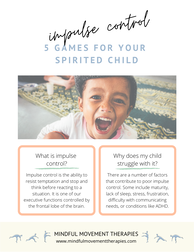Here are recommendations I often give parents of children who struggle with impulse control, in no particular order:
Encourage lots of physical activity. Exercise is one of the best things we can provide our kids. Getting their heart rate up increases blood flow to the brain, allowing for more brain power in challenging situations. Be a super model. Your kids watch you and learn from you. Model waiting patiently, and narrate what your thoughts are using self talk. For instance, you could say something like "this is a really long line for ice cream, but I know it is going to taste so good that I am going to wait." Learn through play. Games like Simon Says, Red Light Green Light, Mother May I, and Follow the Leader can help build impulse control skills. But, check out our 5 favorite games that put impulse control skills into practice!
Make plans.
Talk about situations coming up that may be exciting, overwhelming, or frustrating. Discuss what the child can expect and what is expected of them. Teach your child how to tune into themselves. Talk about and label feelings to build their emotional vocabulary. Build their self-awareness with frequent check-ins throughout the day asking "how are you feeling right now?" Provide chores. Chores help kids put the fun things on hold while the must-do's get done. Have a set of simple daily chores to build delayed gratification. Ask your child to repeat your directions. You could say something like "before you move, explain the directions back to me." This gets them in the habit of thinking before doing. Use screen time sparingly, and intentionally. The highly stimulating visual input and immediate gratification kids experience when using screens increases their arousal level, compromising their self-control. The less time screens are used, the more time their nervous system spends at baseline, where their best executive functioning and impulse control happens. Establish clear limits. Have your kid help you develop a list of household rules and expectations. Include them in discussing what the consequences should be if those rules and expectations are not followed. Be consistent with following through with this plan. Structure and consistency reduces chaos, which can help decrease impulsive behavior. Do not over-schedule your child. When kids are exhausted, it derails their ability to regulate themselves. Have unstructured time and opportunities to rest. I hope this list equips you with some strategies to help your child manage their exuberance more effectively! References: "Brain Rules for Baby" "The Toddler Brain"
0 Comments
Your comment will be posted after it is approved.
Leave a Reply. |
meet the bloggerAusten is a pediatric occupational therapist with experience in schools, early intervention, and private clinic settings. She now runs her own private practice in Portland, OR specializing in movement based learning techniques. This blog's mission is to educate and empower parents and children by sharing insights into the complexities of learning and development. Categories
All
|
MINDFUL MOVEMENT THERAPIES
In-Home Pediatric Occupational Therapy in Portland, Oregon
phone503-720-4634
|
|
|



